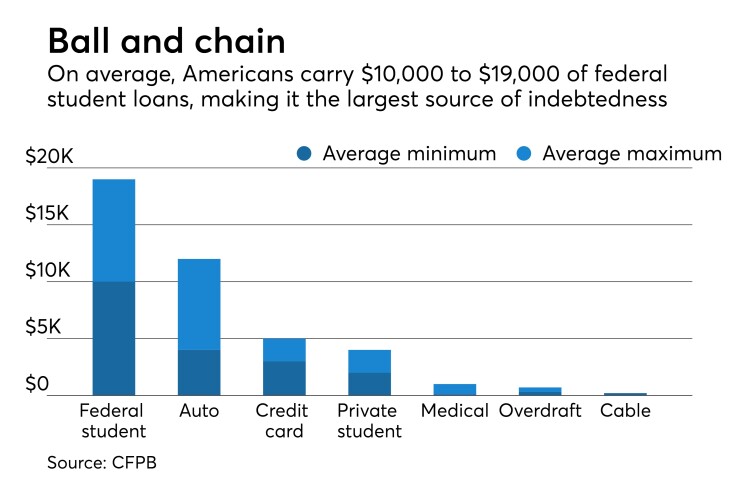The Consumer Financial Protection Bureau's decision to drop a requirement that third parties would be on the hook for the accuracy of consumer debts they purchase is likely to speed the agency's often-delayed efforts to write new rules in the area.
The agency initially suggested it would subject third parties that purchased consumer debt to a requirement that they verify the information, but Director Richard Cordray signaled
It also means that the burden of verifying consumer debt will fall to lenders that originate the debt, but that requirement is likely to be accepted by the industry, representatives said.
"Creditors should be responsible since they are our customers," said Dong Hong, vice president and senior counsel at the Consumer Bankers Association. "For the most part, we're fine with the disclosure regime [the CFPB is] creating. Our members utilize the services of debt collectors, so any requirements placed on them would naturally fold back up to the [first-party] creditors. "

The CFPB has been slow to act on debt collectors, a process that began in 2013, opening the agency to criticism that it still has not completed a rulemaking in four years even though debt collectors receive the largest number of consumer complaints. Even lenders are surprised "that they're still working on this," Hong said.
One reason the agency has had difficulty is that Congress explicitly excluded banks from the Fair Debt Collection Practices Act of 1977, forcing the CFPB to break its debt collection proposals into one part for banks and other first-party creditors, and another for third-party creditors that fall under the FDCPA.
Cordray even touched on the issue, saying the law has not kept paces with changes in the market.
"This area of the law has become outmoded over the past 40 years," he said in a speech on June 8. "Both industry and consumer groups are pressing for updated interpretations of the law because so much is happening in this marketplace that the law cannot easily keep pace with developments. The courts have been forced to try to make sense of the statutory provisions and apply them to a very different world, leading to a patchwork of inconsistent rulings that breed disarray and uncertainty. Conflicting rulings from different courts make it difficult for compliance attorneys to give firm guidance to companies that operate in this realm."
The Supreme Court agrees with that assessment. Justice Neil Gorsuch wrote in a
The CFPB first issued a small-business outline on third-party collectors last July that would limit collection attempts to six times per week and require that debt collectors disclose to consumers if a debt it too old, and therefore is not legally enforceable.
The CFPB is now expected to issue its third-party debt collection plan by the end of this year or early 2018. A rulemaking on first-party creditors would be pushed off to late 2018, or possibly later.
Cutting the substantiation of consumer debt out of the third-party debt collection proposal was a procedural win for the industry.
"The CFPB wants to make sure debt collectors are collecting on the right amount, from the right person," said Maria Wolvin, a vice president and senior counsel of regulatory affairs at ACA International, a trade group representing 3,500 debt collectors, attorneys and debt buyers.
In the small-business outline, the CFPB had a list of information that the bureau said was essential in assessing whether a debt was reasonably owed, and that creditors would provide to debt collectors.
The issue will be what minimum data fields will become standard practice for the industry to use in substantiating the amount of a debt and who owes it.
"The big challenge will be helping banks and creditors communicate the data when everybody has a different system," said Rozanne Andersen, vice president and chief compliance officer at Ontario Systems, a Muncie, Ind., software provider. "Debt collectors cannot begin to assign the debt until they have the minimum data fields needed to substantiate the account."
Often banks have plenty of data on a customer except when an account falls delinquent and ultimately is charged off.
"That is what is fundamentally changing," Andersen said. "The CFPB is proposing rules that impact how data moves in various scenarios from first party to third party with the ultimate goal of ensuring that when debt moves, everybody uses information about the account to substantiate it and ensure they have identified the right consumer. Whoever has the data has to update the next person in the chain."





